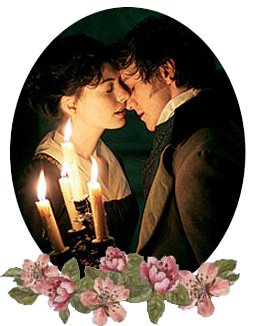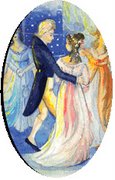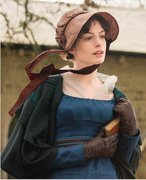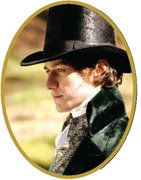Mansfield Park part 3: Drama in the MP drama
 Phew! Finally, my seminar was over, and I can give Jane and Tom more attentions they deserve. First, news. Rachel is off to
Phew! Finally, my seminar was over, and I can give Jane and Tom more attentions they deserve. First, news. Rachel is off to
After learning of Anthony Lefroy, I tend to see the ‘take orders’ in this sentence as Tom Lefroy’s responsibility to take ‘appropriate action’ by marrying Mary Paul to save his family. I’m not sure about ‘my father’ reference (i.e. Sir Thomas Bertram), but indeed we cannot help noticing that such a change would happen at Christmas. Again, Jane Austen placed Christmas (a very important holiday for her) as a very important date in
Drama in the drama
Now, the drama. The theatre episodes in MP covers chapter 12 to 18. Seven chapters just to cover a private play in
Two hundred miles, everyone?
In the midst of discussing
"It is not worth complaining about; but to be sure the poor old dowager could not have died at a worse time; and it is impossible to help wishing that the news could have been suppressed for just the three days we wanted. It was but three days; and being only a grandmother, and all happening two hundred miles off, I think there would have been no great harm, and it was suggested, I know; but Lord Ravenshaw, who I suppose is one of the most correct men in
Michelle suggested that Mr. Yates’ bewailing the untimely death of a relation many miles away was a bit weird, though he had his justifications, that Lord Ravenshaw was to play in the private Lovers’ Vows himself before ‘the poor old dowager’ (i.e. Lord Ravenshaw’s grandmother) died. Yates was callously wishing that the news could have been suppressed for at least for a couple of days until they did the deed.
Placing this situation in Jane/Tom paradigm … what if Tom and Jane were "that close" to coming to an understanding, healing the hurt, when Anthony’s news came and urged him to come to
Okay, let’s look at the numbers now. Two hundred miles away, with a wish of three days’ news delay: two spatial and temporal references. And let’s look again at Chapter 3 (p. 26), as Edmund said to Fanny:
“Why, indeed, Fanny, I should hope to be remembered at such a distance as the White house. You speak as if you were going two hundred miles off, instead of only across the park.”
Hmmm… two hundred miles mentioned at least twice so far. Nothing is random in Jane Austen’s world. I think (and Michelle agrees) that two hundred miles is the reference of something important in Jane and Tom’s life. And via Google Earth, I learned that
We think that the two hundred miles reference in Mansfield Park does not only refer to Lovers’ Vows, but also to the radius among the three sites, or at least Dublin-York and York-London. And about the second reference:
“…it is impossible to help wishing that the news could have been suppressed for just the three days we wanted. It was but three days…”
Three days. THREE DAYS away... from what day? How about November 5, Anthony's wedding? Delaying it three days, we have November 8 or 9, 1798. If particular news could be suppressed at least 3 days... assuming that this reference is Jane/Tom-related, could it mean that Tom wanted to come to Hampshire on November 8 to talk of something very important with Jane? Food for thoughts and more research (as if we don’t have enough on our plates already).
Forced into the Drama
Anyway, Tom Bertram also had seen Lovers’ Vows in
Mary Crawford, being attracted to Edmund, naturally wanted Edmund to play Anhalt. Edmund initially refused, for he disliked the plots in Lovers’ Vows. But then, after three chapters of going round and round about who would play who… and that a Mr. Maddox was to play Anhalt, Edmund changed his heart and appealed for Fanny’s advice (Chapter 16, p. 142).
EB: “I do not know what to do. This acting scheme gets worse and worse, you see. They have chosen almost as bad a play as they could, and now, to complete the business, are going to ask the help of a young man very slightly known to any of us. This is the end of all the privacy and propriety which was talked about at first. I know no harm of Charles Maddox; but the excessive intimacy which must spring from his being admitted among us in this manner is highly objectionable, the more than intimacy – the familiarity. I cannot think of it with any patience; and it does appear to me an evil of such magnitude as must, if possible be prevented. Do not you see it in the same light?"
FP: "Yes; but what can be done? Your brother is so determined."
Fanny could not be more correct. Anthony had eloped anyway at that point!
EB: "There is but one thing to be done, Fanny. I must take Anhalt myself. I am well aware that nothing else will quiet Tom."
Fanny could not answer him.
Of course she could not. How could she? So…Anhalt was the bloke that finally married Amelia, played by Mary Crawford. And, Tom Lefroy should play Anhalt as well; marrying Miss Mary Paul! He realised that nothing but marrying Miss Paul would heal the wound Anthony had caused. Let’s resume.
“It is not at all what I like,” he continued. “No man can like being driven into the appearance of such inconsistency. After being known to oppose the scheme from the beginning, there is absurdity in the face of my joining them now, when they are exceeding their first plan in every respect; but I can think of no other alternative. Can you, Fanny?"
"No," said Fanny slowly, "not immediately, but--"
I remember the 1979 JAP Lefroy article that Arnie sent me (thanks again, Arnie), specifically a letter from Tom Lefroy to Mary, written in 1797 after Tom returned from his engagement to Mary during the 1797 Easter Term:
‘I fear, my dear Mary that you have been cursing Term very heartily for sometime and are almost angry with me for reckoning it so great a friend when it is so much your aversion… but I am drilling for active Service, as it were. I am anxious to come, as near as circumstances will allow, and finish Lawyer to the Bar… You will be repaid… by my best attention for life, and sharing whatever credit may accrue from my labours.’
Mary getting anxious about Tom’s commitment to her, eh? Don’t think that the study was the main reason for Tom delaying the engagement…and somehow Mary sensed it. I am not sure when Tom wrote this letter, but I am inclined to think that it was written before November 1797 when he met Jane again in Bath and felt more urge to cancel his engagement with Mary. I’m not sure if Jane knew that Tom had been engaged by then, but in any case, if he had indicated so, it would not be until Sept/October 1798 before he planned to have a serious conversation with Jane and cancel his commitment with Mary. But Anthony’s wedding changed it all.
Marriage for money
Now, let’s get back to Chapter 16 of
 "But what? I see your judgment is not with me. Think it a little over. Perhaps you are not so much aware as I am of the mischief that may of the unpleasantness that must arise from a young man's being received in this manner: domesticated among us; authorised to come at all hours, and placed suddenly on a footing which must do away all restraints. To think only of the licence which every rehearsal must tend to create. It is all very bad! Put yourself in Miss Crawford's place, Fanny. Consider what it would be to act Amelia with a stranger. She has a right to be felt for, because she evidently feels for herself. I heard enough of what she said to you last night to understand her unwillingness to be acting with a stranger; and as she probably engaged in the part with different expectations--perhaps without considering the subject enough to know what was likely to be-- it would be ungenerous, it would be really wrong to expose her to it. Her feelings ought to be respected. Does it not strike you so, Fanny? You hesitate."
"But what? I see your judgment is not with me. Think it a little over. Perhaps you are not so much aware as I am of the mischief that may of the unpleasantness that must arise from a young man's being received in this manner: domesticated among us; authorised to come at all hours, and placed suddenly on a footing which must do away all restraints. To think only of the licence which every rehearsal must tend to create. It is all very bad! Put yourself in Miss Crawford's place, Fanny. Consider what it would be to act Amelia with a stranger. She has a right to be felt for, because she evidently feels for herself. I heard enough of what she said to you last night to understand her unwillingness to be acting with a stranger; and as she probably engaged in the part with different expectations--perhaps without considering the subject enough to know what was likely to be-- it would be ungenerous, it would be really wrong to expose her to it. Her feelings ought to be respected. Does it not strike you so, Fanny? You hesitate."
Did he just say 'domesticated'? As in 'to accustom to household life or affairs' or MARRIAGE? I’m not sure if ‘domesticated’ has the same meaning now with the one in Jane Austen’s time. But if it does…this passage is a strong indication of Tom Lefroy marrying Miss Paul. And Edmund (TL) also asked Fanny (JA) to put herself in Mary Crawford's (Paul's) shoes... for Tom was after all still engaged with Mary. Or was it Jane Austen asking herself to understand Mary Paul better?
“I am sorry for Miss Crawford; but I am more sorry to see you drawn in to do what you had resolved against, and what you are known to think will be disagreeable to my uncle. It will be such a triumph to the others!”
"They will not have much cause of triumph when they see how infamously I act. But, however, triumph there certainly will be, and I must brave it. But if I can be the means of restraining the publicity of the business, of limiting the exhibition, of concentrating our folly, I shall be well repaid. As I am now, I have no influence, I can do nothing: I have offended them, and they will not hear me; but when I have put them in good-humour by this concession, I am not without hopes of persuading them to confine the representation within a much smaller circle than they are now in the high road for. This will be a material gain. My object is to confine it to Mrs. Rushworth and the Grants. Will not this be worth gaining?"
Let’s see here. RUSHWORTH and GRANTS. Don't the names sound like money and wealth for you? Rush Worth. Grants. Speedy money. In JA's perspective, Tom truly married just for money (well, in all fairness, I think he liked Mary Paul as well, though not as deep as with Jane Austen). For Jane, Tom’s marriage was very political in nature. I don’t think she was wrong.
Fanny seemed nearer being right than Edmund had supposed. The business of finding a play that would suit everybody proved to be no trifle; ...There were, in fact, so many things to be attended to, so many people to be pleased, so many best characters required, and, above all, such a need that the play should be at once both tragedy and comedy, that there did seem as little chance of a decision as anything pursued by youth and zeal could hold out. (Chapter 14, p. 122)
The business of finding a ‘play’ that would ‘suit everybody’ – how about finding a ‘wife’ – a ‘livelihood’ that would suit everybody? After all, Edmund Bertram (and Tom Lefroy) had so many people to be pleased. Was not the business of "marriage" a people-pleasing initiative? Would this not have been how the Irish Lefroy family looked upon their children’s marriages – arrangements to please and humour the Old Judge Uncle?
Let’s resume with Chapter 16 (p. 143):
FP: "Yes, it will be a great point."
EB: "But still it has not your approbation. Can you mention any other measure by which I have a chance of doing equal good?"
FP: "No, I cannot think of anything else."
EB: "Give me your approbation, then, Fanny. I am not comfortable without it."
FP: "Oh, cousin!"
EB: "If you are against me, I ought to distrust myself, and yet--But it is absolutely impossible to let Tom go on in this way, riding about the country in quest of anybody who can be persuaded to act--no matter whom: the look of a gentleman is to be enough.” (emphasise our own)
It's impossible to let Anthony go on his way alone, riding about the country with his new wife... seeking for anyone's support. He, Tom Lefroy, had to come and save his brother. And the bold sections really speak for themselves, do they not? Fanny (Jane) is distraught over Edmund (Tom's) inconsistency and betrayal of his own morality. The ‘acting scheme’ – ‘marriage scheme’ just gets worse and worse.
After reading those passages, we wonder whether Tom finally asked for Jane's approval, or at least understanding. Or was this Jane's wishful thinking of Tom talking to her and asked her permission or blessings? It’s a nice indulging thought that Tom still confided in Jane after returning to

The Lefroy family conflict
Reading the hidden drama beneath the Lovers’ Vows, we see that the
EB: “Family squabbling is the greatest evil of all, and we had better do anything than be altogether by the ears."
Also, the fight between Tom Bertram and his brother Edmund (p. 119):

Here is Tom Bertram berating Edmund over his ‘interference’ and for daring to pass judgement on Tom's own judgement. He is telling Edmund to basically live by his own rules, but not expect others to adopt them. Was this ever Jane's perception of the "selfishness" of Anthony Lefroy? Or was it that Anthony indeed quarrelled with Tom Lefroy before
In any case, Jane Austen seemed to despise the way some of the Lefroys placing burden upon Tom’s shoulders. In Chapter 15 (p. 137), Fanny was forced into acting in the drama, something that she truly did not like. Charming Edmund finally steps in, supporting his cousin's freedom of choice:
"Do not urge her, madam," said Edmund. "It is not fair to urge her in this manner. You see she does not like to act. Let her chuse for herself, as well as the rest of us. Her judgment may be quite as safely trusted. Do not urge her any more."
"I am not going to urge her," replied Mrs. Norris sharply; "but I shall think her a very obstinate, ungrateful girl, if she does not do what her aunt and cousins wish her – very ungrateful, indeed, considering who and what she is."
Here we have Fanny (Tom Lefroy) feeling the pressure of what his family and cousins wish (expect) of him and Jane Austen as the narrator disagreed with the pressure. JA might also wish that someone would talk Tom out of it (the way Edmund tried to reason with Mrs. Norris)... instead of the entire family and friends pushing him.
Next?
I plan to write another article this week about Jane’s gradual change of perception towards Anthony/Tom. I will be rather busy again these weeks, but Michelle and I have committed that we shall continue reading
Reference:
Austen, J. 1814, Mansfield Park (2003 edition), Penguin, London.
Pic 1:
Pic 2: Elizabeth Inchbald, from Chawton.org
Pic 3: Elvington Bridge at the City of York in Yorkshire, from Wikipedia
Pic 4: Dublin-York-London triangle
Pic 5: the play at
Pic 6: Andrew Jack with Alessandro Nivola (Henry Crawford) and Frances O'Connor (Fanny Price), photo by Clive Coote, in Andrewjack.com
Pic 7: Fanny Price and Mary Crawford, Pemberley.com
Pic 8: the stamp of Mary and Henry Crawford, the UK Collectible Stamps
Pic 9: Mary Crawford and Fanny Price, djuna.cine21.com
Pic 10: Fanny and Edmund, from Britmovies UK
Pic 11: James Purefoy as Tom Bertram, from James Purefoy US Fansite



















































2 comments:
I just saw the movie for the first time this weekend, and found your site through Wikepedia. I wrote about it today on my site. I know many of my readers will enjoy your site, as well.
Dear Jen, thank you so much for your lovely comment, also in your website. I will drop another comment there, saying thank you again, and also because I am a tea lover myself. Your site is wonderful! Reminding me to sip my raspberry leave/chamomile infusion now!
Post a Comment